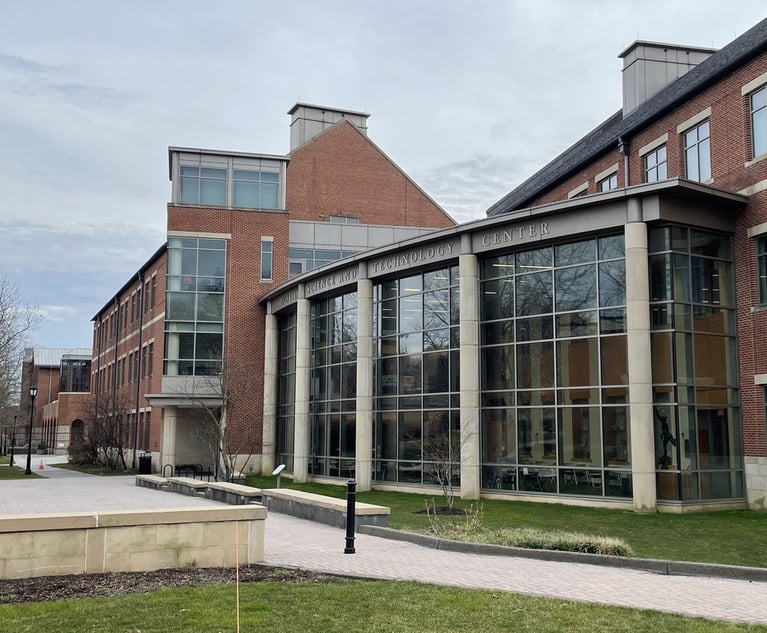 Billion Photos/Shutterstock.com:
Billion Photos/Shutterstock.com: First Batch of Potential Superior Court Candidates Get PBA Rating
The five hopefuls who have been announced so far include a former state legislator, a former county councilwoman, and two Common Pleas judges, one of whom is the brother of former Supreme Court Justice Seamus McCaffery.
January 25, 2019 at 04:49 PM
4 minute read
As the 2019 field of judicial candidates begins to take shape, the Pennsylvania Bar Association's judicial evaluation commission has issued its first round of ratings for potential Superior Court contenders.
The five hopefuls who have been announced so far include a former state legislator, a former county councilwoman, and two Common Pleas judges, one of whom is the brother of former Supreme Court Justice Seamus McCaffery. Only one of the candidates was rated as “highly recommended,” and three received “recommended.” One of the candidates a “not recommended” rating.
The five are vying for two open seats on the court.
Philadelphia Court of Common Pleas Judge Daniel McCaffery was the only candidate to be rated as “highly recommended.” McCaffery is a well-known figure in Philadelphia, having served on the bench for the past five years. Before being elected as judge, he was also a candidate in the 2011 Pennsylvania attorney general race, and in 2009, he was the second-highest vote-getter in the race to become Philadelphia's district attorney.
McCaffery served in the Philadelphia District Attorney's Office before spending 16 years in private practice.
McCaffery is also the brother of former Justice Seamus McCaffery, who stepped down from the high court in 2014 amid several ethics investigations, including for circulating pornographic emails.
In explaining its “highly recommended” rating, the PBA said McCaffery is an “experienced jurist known for his high degree of professionalism and good temperament.”
“Because of his broad experience as a practicing attorney, proven record of judicial leadership, high ethical standards and dedication to the legal profession, the commission is confident that the candidate would serve with distinction[,]” the PBA said.
Former state Rep. Catherine “ Kate” Harper, who had represented portions of Montgomery County for 18 years until losing her seat in the 2018 election, is also running for a spot on the statewide appellate court.
Harper received a “recommended” rating by the PBA's judicial commission. While in the General Assembly, she was chair of the local government committee and sat on the House Judicial Committee. She also drafted legislation to raise the mandatory judicial retirement age to 75.
Harper has been a Timoney Knox attorney for more than 20 years, focusing on municipal law.
In rating Harper as “recommended” the commission noted that she has argued before the U.S. Supreme Court, and has a reputation for “being well prepared, even tempered, industrious and compassionate[.]”
Megan Lee King was also rated as “ recommended.” King, who in 2015 became the deputy district attorney in the child abuse center in Chester County, has spent most of her career as a prosecutor, although she also spent a stint from 1999 to 2001 clerking for Chief Justice Thomas Saylor.
The commission said King is described by attorneys and judges as “intelligent, articulate, fair, well-prepared and diligent.”
Cumberland County Judge Christylee Peck is also hoping to fill a spot on the Superior Court. Peck has worked on both the civil and criminal side of the law, having served as a state prosecutor focusing on sex crimes and child abuse from 2005 through 2011, when she was elected to the Cumberland County bench.
“She is recognized as a hard worker, articulate and accomplished, as well as thoughtful, approachable and fair[,]” the commission said.
The only candidate to receive a “ not recommended” rating is Amanda Green-Hawkins of Allegheny County.
Green-Hawkins has been an attorney for the United Steel Workers since 2002, and previously clerked for New Jersey Superior Court Judge Lawrence Lawson. According to her bio on the Women's Law Project board of trustees website, she also previously served as a council member on the Allegheny County Council.
The PBA's judicial commission said Green-Hawkins has been successful in state and federal court, and that she is known for having a “strong work ethic.” However, the commission said she lacked the “experience and preparation to take on the role of judge on the Pennsylvania Superior Court[.]“
This content has been archived. It is available through our partners, LexisNexis® and Bloomberg Law.
To view this content, please continue to their sites.
Not a Lexis Subscriber?
Subscribe Now
Not a Bloomberg Law Subscriber?
Subscribe Now
NOT FOR REPRINT
© 2024 ALM Global, LLC, All Rights Reserved. Request academic re-use from www.copyright.com. All other uses, submit a request to [email protected]. For more information visit Asset & Logo Licensing.
You Might Like
View All
Phila. Jury Hits Sig Sauer With $11M Verdict Over Alleged Gun Defect
3 minute read

Judge Approves $1.15M Settlement, Reduces Attorney Award in COVID-19 Tuition Reimbursement Suit
4 minute read
Dechert 'Spark Tank' Competition Encourages Firmwide Innovation Focus
Trending Stories
- 1Clark Hill Acquires L&E Boutique in Mexico City, Adding 5 Lawyers
- 26th Circuit Judges Spar Over Constitutionality of Ohio’s Ballot Initiative Procedures
- 3On The Move: Polsinelli Adds Health Care Litigator in Nashville, Ex-SEC Enforcer Joins BCLP in Atlanta
- 4After Mysterious Parting With Last GC, Photronics Fills Vacancy
- 5Latham Lures Restructuring Partners From Weil, Paul Weiss
Who Got The Work
Michael G. Bongiorno, Andrew Scott Dulberg and Elizabeth E. Driscoll from Wilmer Cutler Pickering Hale and Dorr have stepped in to represent Symbotic Inc., an A.I.-enabled technology platform that focuses on increasing supply chain efficiency, and other defendants in a pending shareholder derivative lawsuit. The case, filed Oct. 2 in Massachusetts District Court by the Brown Law Firm on behalf of Stephen Austen, accuses certain officers and directors of misleading investors in regard to Symbotic's potential for margin growth by failing to disclose that the company was not equipped to timely deploy its systems or manage expenses through project delays. The case, assigned to U.S. District Judge Nathaniel M. Gorton, is 1:24-cv-12522, Austen v. Cohen et al.
Who Got The Work
Edmund Polubinski and Marie Killmond of Davis Polk & Wardwell have entered appearances for data platform software development company MongoDB and other defendants in a pending shareholder derivative lawsuit. The action, filed Oct. 7 in New York Southern District Court by the Brown Law Firm, accuses the company's directors and/or officers of falsely expressing confidence in the company’s restructuring of its sales incentive plan and downplaying the severity of decreases in its upfront commitments. The case is 1:24-cv-07594, Roy v. Ittycheria et al.
Who Got The Work
Amy O. Bruchs and Kurt F. Ellison of Michael Best & Friedrich have entered appearances for Epic Systems Corp. in a pending employment discrimination lawsuit. The suit was filed Sept. 7 in Wisconsin Western District Court by Levine Eisberner LLC and Siri & Glimstad on behalf of a project manager who claims that he was wrongfully terminated after applying for a religious exemption to the defendant's COVID-19 vaccine mandate. The case, assigned to U.S. Magistrate Judge Anita Marie Boor, is 3:24-cv-00630, Secker, Nathan v. Epic Systems Corporation.
Who Got The Work
David X. Sullivan, Thomas J. Finn and Gregory A. Hall from McCarter & English have entered appearances for Sunrun Installation Services in a pending civil rights lawsuit. The complaint was filed Sept. 4 in Connecticut District Court by attorney Robert M. Berke on behalf of former employee George Edward Steins, who was arrested and charged with employing an unregistered home improvement salesperson. The complaint alleges that had Sunrun informed the Connecticut Department of Consumer Protection that the plaintiff's employment had ended in 2017 and that he no longer held Sunrun's home improvement contractor license, he would not have been hit with charges, which were dismissed in May 2024. The case, assigned to U.S. District Judge Jeffrey A. Meyer, is 3:24-cv-01423, Steins v. Sunrun, Inc. et al.
Who Got The Work
Greenberg Traurig shareholder Joshua L. Raskin has entered an appearance for boohoo.com UK Ltd. in a pending patent infringement lawsuit. The suit, filed Sept. 3 in Texas Eastern District Court by Rozier Hardt McDonough on behalf of Alto Dynamics, asserts five patents related to an online shopping platform. The case, assigned to U.S. District Judge Rodney Gilstrap, is 2:24-cv-00719, Alto Dynamics, LLC v. boohoo.com UK Limited.
Featured Firms
Law Offices of Gary Martin Hays & Associates, P.C.
(470) 294-1674
Law Offices of Mark E. Salomone
(857) 444-6468
Smith & Hassler
(713) 739-1250





